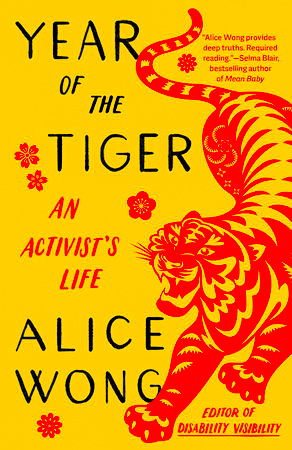
Under the Chinese zodiac, those born in the Year of the Tiger are said to be confident, passionate and ambitious. It seems fitting then that “Year of the Tiger: An Activist’s Life,” a memoir by Alice Wong, is filled with a ferocious, sharp-toothed energy that would impress even the mightiest big cat.
Wong, a self-described “disabled oracle,” is the founder of the Disability Visibility Project, as well as the editor of the “Disability Visibility” anthology. She was born with a type of muscular dystrophy which made it so that she stopped walking at around seven or eight years old. However, if you are looking for a feel-good parable about someone persevering “despite their disability!” or a leering account of the pain, humiliation and trauma of enduring ableism, then this memoir is not for you.
In “Year of the Tiger,” Wong lets the reader know right from the introduction that she was uninterested in writing the “inspirational, exceptional, heroic, angelic, tale-of-adversity, or courageous narratives” that she typically sees in disability memoirs. Rather, she describes “Year of the Tiger” as “an impressionistic narrative comprising irregular dots that fade, drift, and link rather than a soaring, symmetrical arc.”
Indeed, you will find no profound, bleeding heart monologues about the meaning of life here. Wong instead fills the memoir with — well, with whatever she wants to. The memoir includes odes to her favorite foods, childhood stories filled with mischief, a cartoon about how much she loves cats and even a crossword with a “Year of the Tiger” theme.
The book’s structure, which challenges the genre of the memoir, reflects this wide variety in subject matter. “Year of the Tiger” is structured almost like a scrapbook or a zine, containing a rich collection of essays, podcast and interview transcripts, art, recipes, mantras, photos, tweets and advice that all weave together to create a bright, colorful snapshot of Wong’s life so far.
Although this memoir seeks to be more than the publishing industry’s typical “disabled memoir,” it would be inaccurate to say that “Year of the Tiger” is completely disconnected from Wong’s experiences and identities.
“Spending several decades on Earth has been quite a thing for this disabled Asian American woman in a hostile and unforgiving climate,” Wong writes in the introduction. “Clawing, hissing, and fighting through a pandemic, against inequities in vaccine access and eugenic policies and attitudes that consider certain groups disposable, have given me the need to pause and reflect on all that I’ve been through.”
Wong writes so candidly and fiercely that it is hard not to come away from each chapter with a changed mind. She writes about the joy and loneliness that came with growing up disabled and Asian in Indianapolis, the frustration she feels with the ableism of the environmentalist movement, the giddiness of meeting former President Barack Obama in the form of a telepresence robot and much more.
I found myself laughing out loud during some sections and wanting to scream into my pillow out of rage at the system during others. Just like with a scrapbook or zine, Wong’s emotions, arguments and ideas are so palpable that you can almost feel the mishmash of different textures and colors and mediums jumping from the page.
This year, 2022, is another Year of the Tiger. Here’s hoping that “Year of the Tiger” can teach us how to live by Wong’s example and harness our own big cat energy.























































































































